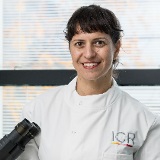
Cambridge Healthtech Institute Training Seminars offer real-life case studies, problems encountered, and solutions applied, along with extensive coverage of the academic theory and background. Each training seminar offers a mix of formal lecture and interactive discussions and activities to maximize the learning experience. These training seminars are led by experienced instructors who will focus on content applicable to your current research and provide important guidance for those new to their fields.
Training Seminars Will Be Offered In Person Only
To ensure a cohesive and focused learning environment, moving
between conference sessions and the training seminars is not allowed.
Monday, 10 November 2025 08:30 - 17:00
TS1: AI-Driven Design of Biologics: A Hands-on Guide to Using State-of-the-Art ML Protein Models
Participants are expected to have some prior exposure to computational modelling tools (e.g. Python, R, COOT, Rosetta, AutoDock Vina, etc.) but limited experience applying them to their projects. They should be comfortable using Jupyter notebooks and prepared to explore topics such as evaluating metrics, determining appropriate sampling sizes, and selecting key adjustable parameters. While this course does not cover ligand docking or protein-protein docking, it is well-suited for those interested in antibody modeling and, potentially, enzyme design language models.
Topics to be covered:
- Building practical experience with AI-based modelling of proteins
- A breakdown of input formats, command lines, and analysis of output
- Hands-on exercises using real-world scenarios in antibody structure prediction, developability pre-screening, immunogen solubilization, and de novo binder design
- Discussion of and guidance on questions like how many models, in silico selection metrics and ranking, and how many to test in the lab
- Pipelining of protein design software and the critical use of an “oracle”?
INSTRUCTOR BIOGRAPHIES:
 David P. Nannemann, PhD, Vice President, Rosetta Commons Foundation
David P. Nannemann, PhD, Vice President, Rosetta Commons Foundation
TS2: Introduction to Multispecific Antibodies: History, Engineering, and Application
Topics to be covered:
- A brief history of bispecific antibodies: 60 years of progress with critical advances and key pioneers
- Bispecific applications and powerful mechanisms-of-action
- Engineering bispecific antibodies:100 formats and counting
- Bispecific-specific considerations in preclinical development and regulatory landscape
- Developability, manufacturing, and analytical considerations
- Clinical experience, translation, and regulatory approval
- Current trends and future opportunities in regulating immune checkpoints, cell-based therapies, and personalised approaches
INSTRUCTOR BIOGRAPHIES:
 G. Jonah Rainey, PhD, Associate Vice President, Eli Lilly and Company
G. Jonah Rainey, PhD, Associate Vice President, Eli Lilly and Company
Tuesday, 11 November 2025 08:30 - 18:35
TS7A: Introduction to Machine Learning for Biologics Design
- Basics of machine learning and where does it fit into drug discovery
- Modern homology modelling and structure prediction
- Predicting antibody affinity and specificity modulation
- Generative design in biologics: Library design and language models
- Machine learning applications of T cell and B cell immunogenicity
- Methods and application of ML for chemical, folding, solution stabilities
INSTRUCTOR BIOGRAPHIES:
 Francis Gaudreault, PhD, Associate Research Officer, Human Health Therapeutics, National Research Council Canada
Francis Gaudreault, PhD, Associate Research Officer, Human Health Therapeutics, National Research Council Canada
TS8A: Introduction to Analytical Characterisation and Quality Control for Biological Products
Topics to be covered (what you will learn)
- The evolving modality of therapeutic biological products
- QbD and DoE: Analytical development, qualification, validation, and post-validation for quality control
- Biologics instability: developability, forced degradation, and formulation development
- Product strength methods: protein concentration, DNA concentration and viable cell density
- Product purity/impurities methods: HPLC and CE (charge variant analysis)
- Product potency methods: bioassays, ELISA, SPR, and CBA
- Product identity methods: peptide mapping, sequencing, icIEF, binding ELISA, FCM
- Product safety: methods of process impurities (residual HCP by ELISA and MS, polysorbate degradation) and contaminants (microbiological attributes, adventitious agents)
- Characterisation of aggregates and SVP analysis
- Extended characterisation: LC-MS, MAM, PTM, charge variant analysis, and HOS analysis
- CMC analytical comparability exercise
Who should attend? (Who will benefit from this training)
The class is for academics, scientists new to industry, and veterans wanting an update on the current state of biologics analytical field. It is beneficial to the individuals involved in biologics drug discovery, developability assessment, analytical development, formulation development, process development, biologics manufacturing, quality control, quality assurance, clinical supply, regulatory affairs, project management, or related functional areas.
INSTRUCTOR BIOGRAPHIES:
 Kevin Zen, PhD, Principal Consultant, Biologics CMC Consulting
Kevin Zen, PhD, Principal Consultant, Biologics CMC Consulting
TS9A: Everything You Ever Wanted to Know about Immunogenicity
INSTRUCTOR BIOGRAPHIES:
 Chloé Ackaert, PhD, Senior Scientist, Immunogenicity, IQVIA Laboratories
Chloé Ackaert, PhD, Senior Scientist, Immunogenicity, IQVIA Laboratories
 Timothy Hickling, PhD, Former, Investigative & Immunosafety Chapter, Roche
Timothy Hickling, PhD, Former, Investigative & Immunosafety Chapter, Roche
 Sofie Pattyn, Founder & CTO, IQVIA Laboratories
Sofie Pattyn, Founder & CTO, IQVIA Laboratories
* 活动内容有可能不事先告知作更动及调整。
会议议程
工程分会
标靶分会
双特异性分会
免疫疗法分会
分析法分会
- Optimisation & Developability
优化和可开发性 - Analytical Characterisation
分析方法的表征 - Protein Stability & Formulation
蛋白质稳定性和配方








